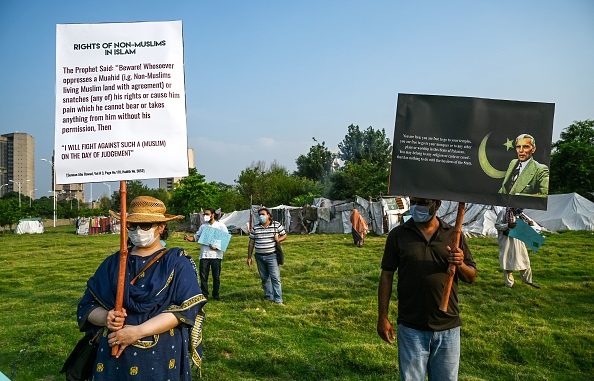
religiIslamabad — Pakistan’s Council of Islamic Ideology (CII) has given a nod to construction of a Hindu Temple in the capital city of Islamabad.
“Keeping in view the existing population of the Hindus in Islamabad, the ancient temple and the adjoining dharamshala (community residence) at Saidpur village be opened to the Hindus and the community be allowed to have access to the temple so they can perform the religious services according to their beliefs,” the CII ruling said.
The ruling also states that there is no constitutional provision or Sharia (Islamic law) against the construction of a temple in Pakistan. Further, it declared there is “nothing wrong according to Sharia” for the Hindu community to have a community center to hold wedding ceremonies and observe religious festivals under the Constitution.
The Council of Islamic Ideology is a constitutional body that advises the legislature on whether a certain law is repugnant to Islam. It issued the ruling on advice sought by the Pakistan’s Ministry of Religious Affairs in June after the government’s move to allocate funds for construction of Shri Krishna Mandir (a temple to venerate Hindu god Krishna) became contentious.
It also advised the government to hand over a 16th century temple venerating the Hindu god Ram in Saidpur Village, Islamabad, to the Hindu community. Until now, visitors were not allowed to offer prayers in the temple because it was recognized as a heritage site. The temple is surrounded by shops and restaurants. The caretaker of the temple said no one was allowed inside to worship as it is a heritage site.
“I do not know anything about the CII ruling and will wait for the orders from the Islamabad administration,” said Muhammad Anwar, the caretaker.
The CII, noting that Pakistan’s Constitution gives various religious groups the right to have a place to perform last rites according to their faith, said, “It is permitted the Hindu community in Islamabad have a place where they can perform the last rites of the deceased according to religious instructions.”
In its ruling, the panel of top Islamic scholars said there was no tradition of the government providing funds to places of worship owned by private parties. “Therefore, the council cannot support the provision of government funds for the construction of the temple.”
However, the body suggested alternatives to resolve the funding issues.
It mentioned the Nehru-Liaquat Pact of 1950 that led to establishment of the Evacuee Trust Property Board (ETPB) in Pakistan and a similar entity in India.
Under the ETPB, a board was established in India to care for mosques and facilitate pilgrims visiting shrines of Muslim saints. Likewise, in Pakistan, the ETPB is responsible for the care of Hindu temples, Gurudwaras (religious shrine) of the Sikh community, and facilitating the visitors to these places.
The EPTB collects rent from abandoned properties belonging to the Hindu and Sikh communities built prior to 1947. The council has suggested making amendments to the act governing the EPTB to meet the financial needs.
The second solution proposed by the council is to create a block fund for the non-Muslim communities and hand it over to them. There would be no Sharia constraint on the use of that fund.
The previous Pakistan government under Prime Minister Nawaz Sharif had allocated 2,400 square yards for construction of the Krishna Mandir in Islamabad. Current Prime Minister Imran Khan extended PKR 100 million ($622,568) for construction of the temple, including a crematorium and community center, in June last year.
The groundbreaking ceremony drew criticism from religious leaders and the general public as well. Some people invaded the site in an attempt to block construction. In a widely circulated video, a young man is seen tearing down the wall of the temple. In another video, a man is seen standing on a pile of bricks, which was once a wall, reciting the Azaan (the call to prayer) to declare the temple could not be built on that piece of land.
“Pakistan was founded in the name of Islam. Constructing a new temple in Islamabad is an insult to Islam,” Chaudhry Pervaiz Elahi, the speaker of the Punjab Assembly and an ally of Prime Minister Khan, said in June. Elahi was among the most prominent of those opposing construction of the temple.
The religious leaders, too, had warned they would not allow the provision of funds for construction of a “den of infidels.”
The Hindu political leaders of Pakistan praised the decision to build and fund the temple.
“Now, the Islamabad administration should issue a no-objection certificate to the Hindu Panchayat Islamabad (the Hindu Council of Islamabad) to erect the boundary wall around the plot allotted by the government,” Lal Malhi, a Hindu member of Pakistan’s parliament, told Zenger News. “I will request the Panchayat to start work on the community hall and shamshaan ghat (crematorium) at the earliest.”
Malhi said that the Panchayat had halted construction of the boundary wall after “some unpleasant incidents occurred at the site.”
About 3,000 Hindus live in Islamabad. The vast majority of Pakistan’s 8 million Hindus live in the southern province of Sindh. Hindus make up about 4 percent of the country’s population.
(Edited by Uttaran Das Gupta and Judy Isacoff.)
The post Pakistan Allows Construction of Hindu Temple in Islamabad appeared first on Zenger News.
